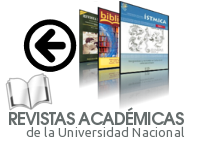The Pedagogy of Alterity in the Deconstruction of Xenophobia and the Construction of Nos-Others: A view from the Perception of Civic Education Teachers of the Dirección Regional de San José Oeste
DOI:
https://doi.org/10.15359/rp.25.8Keywords:
Social Studies, migration, pedagogy of otherness, interculturality, xenophobia, Civic EducationAbstract
The purpose of this document is to articulate different processes that intervened in the final graduation work of the Licenciatura of Social Studies and Civic Education Teaching. From a theoretical point of view, an analysis is carried out based on concepts such as xenophobia, interculturality, Civic Education and Pedagogy of Otherness. These concepts are fundamental for the methodological section where each of the stages implies the development of the proposed objectives: the documentary analysis, interviews with teachers and administrators and teacher training workshop on the pedagogy of otherness. From the pedagogy of otherness, the deconstruction of practices that tarnish adequate human coexistence, such as xenophobia, is advocated for the construction of a pedagogy of Nos-Others, where, based on empathy and otherness, the understanding of the other and their contributions is sought in the construction of a just and democratic society.
References
Barrantes, R. (2016). Investigación: un camino al conocimiento. Un enfoque cualitativo y cuantitativo y mixto (2ª. ed). San José, Costa Rica: EUNED.
Campos, J. (2015). Cómo hacer un trabajo final de graduación: Lineamientos para la Escuela de Ciencias de la Educación. San José, Costa Rica: UNED.
Cea, M. y Valle, M. (2011). Informe sobre la evolución del racismo y la xenofobia en España. España: Subdirección General de Información Administrativa y Publicaciones. https://www.inclusion.gob.es/oberaxe/es/ejes/analisis/informes/index.htm
Ministerio de Educación Pública. (2020). Plantilla de planeamiento Educación Cívica II Periodo de décimo año. https://cajadeherramientas.mep.go.cr/app/
Mudde, C. (2019). La ultraderecha hoy. Barcelona, España: Paidós.
Ortega, P. (Ed.). (2014). Educar en la alteridad. Editorial REDIPE.
Rehaag, I. (2006). “Reflexiones acerca de la interculturalidad”. CPU-e. Revista de Investigación Educativa, (2), 1-9. http://www.redalyc.org/articulo.oa?id=283121711004
Vallejo, S. (2014). La pedagogía de la alteridad: Un modo de habitar y comprender la experiencia educativa del presente. Revista Fundación Universitaria Luis Amigó, 1(2), 114-125. https://doi.org/10.21501/23823410.1333
Published
How to Cite
Issue
Section
License
Los autores que publican en esta revista están de acuerdo con los siguientes términos:
a) Los autores conservan los derechos de autor y garantizan a la revista el derecho de ser la primera publicación del trabajo bajo una Licencia Creative Commons Atribución-NoComercial-CompartirIgual 4.0 Internacional (https://creativecommons.org/licenses/by-nc-sa/4.0/) que permite a otros compartir el trabajo con un reconocimiento de la autoría del trabajo y la publicación inicial en esta revista (componente BY o atribución). Coincidente con la política de Acceso Abierto, no se podrán hacer usos comerciales de los contenidos publicados por esta revista (componente NC). Se permitirán las obras derivadas (remezcla, transformación o creación a partir de la obra original) siempre y cuando sean distribuidas bajo la misma licencia de la obra original (componente SA).
b) Los autores pueden establecer por separado acuerdos adicionales para la distribución no exclusiva de la versión original de la obra publicada en la revista (por ejemplo, situarlo en un repositorio institucional o publicarlo en un libro), siempre y cuando: a) sea reconocida la publicación original en esta revista (componente BY); b) no se haga uso del material de reuso con propósitos comerciales (componente NC); c) el material de reuso sea distribuido bajo la misma licencia de la obra original (componente SA).
c) Se permite y se anima a los autores a difundir sus trabajos electrónicamente (por ejemplo, en repositorios institucionales o en su propio sitio web) antes y durante el proceso de envío, ya que puede dar lugar a intercambios productivos, así como a una citación más temprana y mayor de los trabajos publicados (Véase The Effect of Open Access) (en inglés).


_11.55_.09_a_._m_._.png)
_1.34_.01_p_._m_._2.png)
_9.45_.02_p_._m_._.png)




_2.23_.09_p_._m_._.png)
_2.35_.17_p_._m_._.png)

